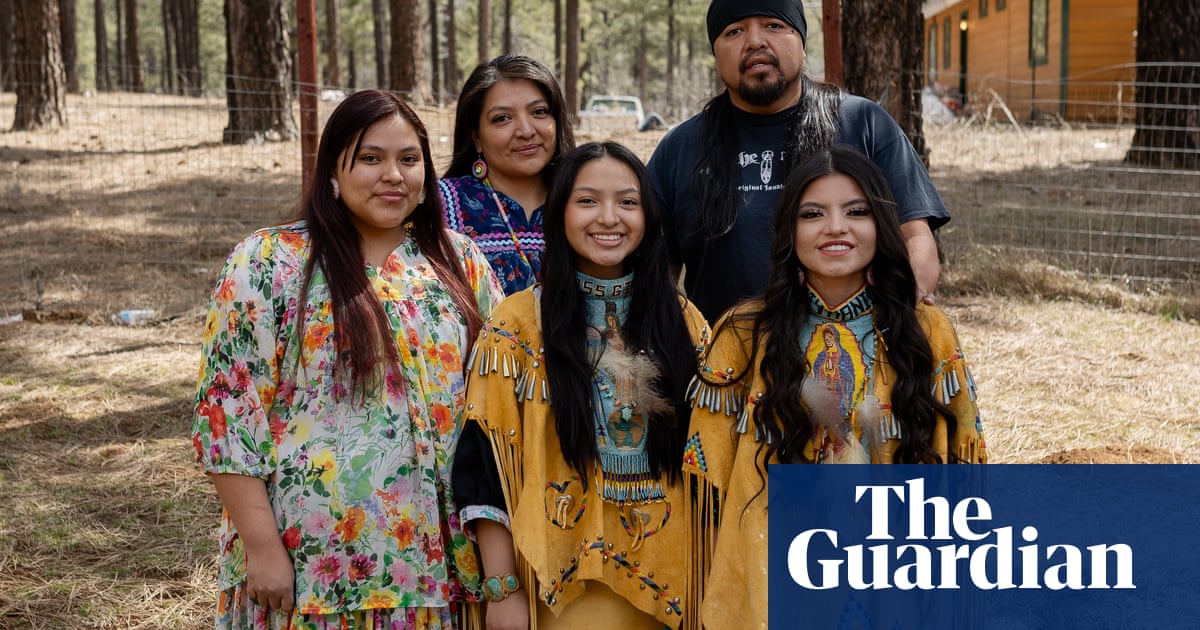They took part in Apache ceremonies. Their schools expelled them for satanic activities

🌈 Abstract
The article discusses the conflict between traditional Apache cultural practices, such as the Sunrise Dance ceremony, and the Christian teachings of the Wisconsin Evangelical Lutheran Synod (Wels) church operating on the Fort Apache Reservation in Arizona. It explores how the Wels church has disciplined and expelled Apache students from its East Fork Lutheran school for participating in the Sunrise Dance, viewing it as a form of "devil worship". The article also examines the historical context of Christian missionary efforts to assimilate and suppress Indigenous cultures, as well as the ongoing struggle of Apache families to preserve their traditions in the face of this religious opposition.
🙋 Q&A
[01] The Conflict Between Apache Traditions and Christian Teachings
1. What were the key events described in the article regarding the conflict between Apache traditions and Christian teachings?
- In 2019, three teenage girls were punished by East Fork Lutheran school for participating in a Sunrise Dance, a traditional Apache ceremony. Two were expelled, and the third was given a warning.
- The school leadership viewed the Sunrise Dance as a form of "devil worship" and used photos of the event posted on Facebook as evidence for the expulsions.
- This pattern of expulsions for participating in traditional Apache ceremonies has been ongoing for over a century at the school.
2. How did the Apache families respond to the school's actions?
- Apache families argued that the Sunrise Dance is a sacred ceremony and another way of praying to God, but the school leadership disagreed with this interpretation.
- Some families chose to send their children to the school despite its anti-traditional policies, hoping their children would not get caught participating in ceremonies.
- Other families continued to have their children participate in the Sunrise Dance, ignoring the school's policies and fearing their children would be expelled if discovered.
3. What was the impact of the expulsions on the Apache students and their cultural identity?
- The expulsions instilled fear in the Apache students, cracking the foundation of Apache pride that their families had worked to build.
- Some students became confused about the nature of their cultural identity, questioning whether participating in Apache ceremonies was considered "worshiping false idols" as their teachers had told them.
- The expulsions led some students to disengage from their culture and avoid discussing or participating in it, even after graduating from the school.
[02] The Historical Context of Christian Missionary Efforts
1. What is the history of Christian missionary efforts to assimilate and suppress Indigenous cultures in the United States?
- The article traces the history back to the 1493 papal decree, the doctrine of discovery, which consecrated any "new" territory not yet inhabited by Christians for the Christian world.
- This doctrine was later reminted as the doctrine of manifest destiny, which justified the westward expansion of the United States and the suppression of Indigenous cultures.
- The establishment of the Office of Indian Affairs in 1883 made it illegal to participate in traditional ceremonies, and the Dawes Act of 1887 provided land to religious organizations to support their missions.
- Federal boarding school policies forcibly removed Apache children from their families and attempted to militarize and alter their identities, forbidding them from practicing their religion or speaking their language.
2. How have Christian denominations, such as the Wels, continued this legacy of suppressing Indigenous traditions?
- The Wels church has been active in Arizona since 1893 as part of its Apache Mission, with the goal of converting "unreached tribes" to Christianity.
- The Wels church operates the East Fork Lutheran school on the Fort Apache Reservation and has a history of disciplining and expelling students for participating in traditional Apache ceremonies.
- The church's sermons and teachings often include disparaging remarks about tribal practices, including the Sunrise Dance and the work of medicine men, portraying them as "demonic manifestations".
[03] The Ongoing Struggle to Preserve Apache Traditions
1. How have Apache families and communities responded to the continued suppression of their traditions?
- Some Apache families choose to send their children to the East Fork Lutheran school despite its anti-traditional policies, believing a Christian education will supplement their Indigenous heritage.
- Other families continue to have their children participate in the Sunrise Dance and other traditional ceremonies, ignoring the school's policies and fearing their children will be expelled if discovered.
- Some Apache families have moved their children to public schools or other educational institutions off the reservation to avoid the Wels church's influence and allow their children to be more proud of their traditions.
- The White Mountain Apache Tribal Council is in a difficult position, as they could take back the land the East Fork Lutheran school is on, but the school is still seen as a better option than the Bureau of Indian Affairs schools.
2. What efforts have been made to protect Indigenous religious practices and cultural identity?
- The Oglala Lakota Nation in South Dakota voted in 2022 to require all missionaries and religious groups to register and go through a background investigation before entering the reservation and working.
- The Catholic Church and the Church of Jesus Christ of Latter-day Saints (Mormon) operating on the Fort Apache Reservation do not include anti-traditional-Apache rhetoric in their sermons and ideology.
- Some Apache community members, such as Father John Cormack of the St Francis of Assisi Catholic Church, actively incorporate Apache traditions and symbols into their Christian practices.
- However, there are currently no legal precedents or federal laws or policies that could be used to protect Indigenous beliefs in the context of private schools like East Fork Lutheran.